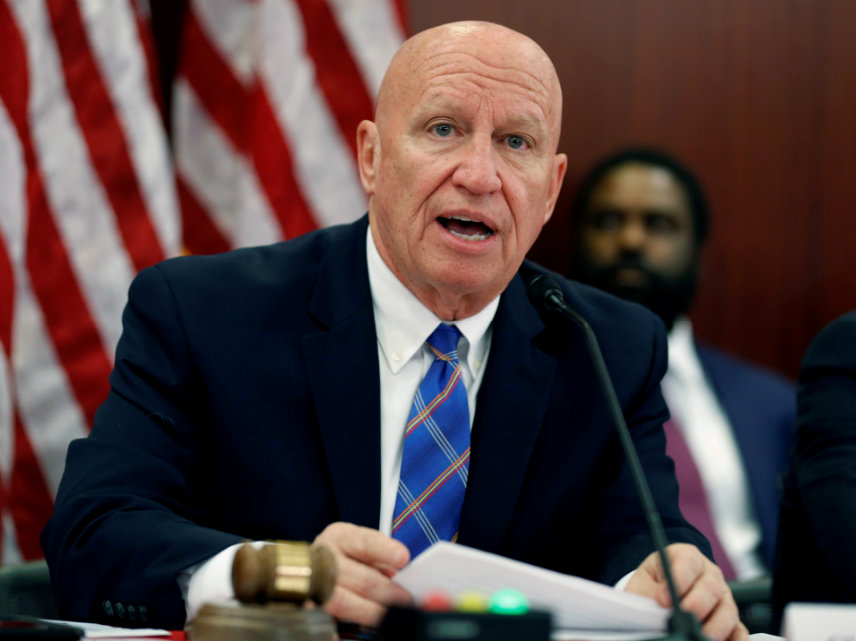GOP's 'Tax Reform 2.0' Will Make It Harder to Balance the Budget
Plan would extend last year's tax cuts past 2025, but spending cuts are still missing.

Without a serious plan to cut spending, extending last year's tax cuts beyond their scheduled expiration in 2025 will require that America enjoys an historically unprecendented—and completely unrealistic—period of growth to balance the budget.
Yet that is exactly the bet that formerly fiscally conservative Republicans appear to be making, as they unveiled a package of bills Monday collectively known as "Tax Reform 2.0" The centerpiece of the proposal is a bill jointly sponsored by all the Republicans on the House Ways and Means Committee that would make permanent the lower individual and corporate tax rates approved in December but set to expire after 2025—something that Republicans planned to do even before last year's tax reform passage. Committee chairman Kevin Brady (R-Texas) says the package could be ready for a committee vote before the end of the week and a full House vote by the end of the month.
Extending the tax cuts, Republicans hope, is a way to extend the economic growth stoked by last year's efforts. It's also a political ploy to bolster the GOP in the coming midterms. But the package seems to completely ignore concerns about the growing federal deficit—which will hit $1 trillion next year—or the long-term consequences that tax cuts, without spending cuts, are having on the national debt.
This is not exactly new. Republicans waved off concerns about how Tax Reform 1.0 would impact the deficit by promising that greater economic growth would fill the gap created by the tax bill—despite the fact that not a single projection, including the administration's own, showed that was possible. Similarly, GOP leaders ignored the debt and deficit in agreeing earlier this year to a two-year budget plan that hiked both domestic and military spending. Cutting taxes and increasing spending is exactly the wrong way to go about balancing a budget.
Can economic growth alone do the trick? It seems to be the only hope. With current spending and tax policies in place (meaning that the tax cuts enacted last year would expire, as planned), America would need 4.8 percent average growth over the next decade to balance the budget, according to the Committee for a Responsible Federal Budget's analysis of numbers provided by the Congressional Budget Office.
While President Donald Trump is rightfully ecstatic to be presiding over an economy growing at better than 4 percent in recent quarters, it's beyond improbable to think that 5 percent growth for an entire decade is possible. We've already enjoyed a nearly unprecedented run of growth since the end of the Great Recession and another downturn is surely due eventually. Even if 4.8 percent growth were possible for the next 10 years, that would merely balance the budget and would do nothing to address the $21 trillion national debt.
Using a more realistic expectation of economic growth, the Congressional Budget Office's "alternative fiscal scenario" (where the tax cuts and spending deal become permanent) envisions America facing a $2.1 trillion deficit by 2028. Closing that gap, the CRFB says, would require average growth of 5.9 percent for the next decade.
It is therefore unreasonable to believe that economic growth alone will close the federal deficit. Against that backdrop, the Tax Reform 2.0 plan appears to be an irresponsible plan that will only add to the bill future Americans must pay.
That doesn't mean the package is all bad, of course. A proposal to created so-called universal savings accounts should be taken seriously by Congress. If passed, the bill would allow Americans to create tax-advantaged savings accounts where they could stash up to $5,000 annually without having to deal with all the restrictions and limitations that come with similarly structured 401(k) and IRA plans now. Encouraging savings—espescially savings that are partially sheltered from the tax man—would be a positive step that helps families plan for the future.
Congress should apply that same lesson to its own budgeting. When times are good, it makes sense to save for the future and pay off debts. Instead, during the current run of economic growth, the debt and deficit are nearing all-time highs.
Tax Reform 2.0 repeats the worst errors the current Republican Congress has made. It mistakes tax cuts for fiscal responsibility and substitutes pie-in-the-sky economics for what's really needed: a sober reckoning with America's worsening budgetary situation.


Show Comments (235)